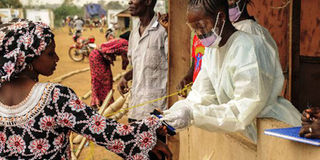‘Digital wallets’ helped Sierra Leone contain Ebola outbreak: study

Sierra Leonean health officials checking ebola virus on passengers transiting at the border crossing with Liberia in Jendema on March 28, 2015. PHOTO | FILE | AFP
What you need to know:
- By using digital system to pay Ebola response workers, Sierra Leone massively cut on time spent, avoiding large-scale strikes and ensuring a stable workforce to defeat Ebola, the United Nation’s survey dubbed ‘Better Than Cash Alliance’ showed.
- The speed with which Ebola spread meant the government needed a more efficient, reliable and secure measure to manage payments to response workers in a country where there were fewer than 50 ATMs when the outbreak struck.
Mobile cash transfer system dubbed “digital wallets” is playing a major role in the fight against the spread of Ebola in West Africa, a new study has revealed.
By using digital system to pay Ebola response workers, Sierra Leone massively cut on time spent, avoiding large-scale strikes and ensuring a stable workforce to defeat Ebola, the United Nation’s survey dubbed ‘Better Than Cash Alliance’ showed.
Mr Momodu Kargbo, Sierra Leone’s Minister of Finance and Economic Development says: "Sierra Leone's firsthand experience with digital payments and its impact on Ebola response and control taught us that, governments like ours must take this growing payment system seriously as it can significantly contribute to inclusive growth and transparency.”
He added: “one of the major challenges of cash is that it is expensive, slow, difficult to transport and vulnerable to theft, graft and payment errors. Late or incorrect payments to response workers often led to strikes.”
Sierra Leone was one of the hard hit countries during the Ebola outbreak, with more than 14,000 cases of the 28,000 total reported cases in West Africa.
Ebola response workers were spread across Sierra Leone’s 14 districts, including many health units in rural areas.
According to the study, digital payments reduced these strikes from an average of eight per month - causing the loss of about 800 working days per month – to virtually zero.
The speed with which Ebola spread meant the government needed a more efficient, reliable and secure measure to manage payments to response workers in a country where there were fewer than 50 ATMs when the outbreak struck.
Digital payments offered a powerful solution, particularly given Sierra Leone already had mobile network coverage across nearly 95 per cent of the country, and more than 90pc of response workers with access to a mobile phone.
“Ebola response workers put their lives at risk every day. It was vitally important they received all the money they earned, with no skimming or theft. They got it immediately, as their families had no other income; and only legitimate workers got paid - no one else. Paying Ebola response workers directly into a digital wallet instead of cash met these goals, saved lives and over $10 million,” said Dr Ruth Goodwin-Groen, Managing Director of the Better than Cash Alliance.





